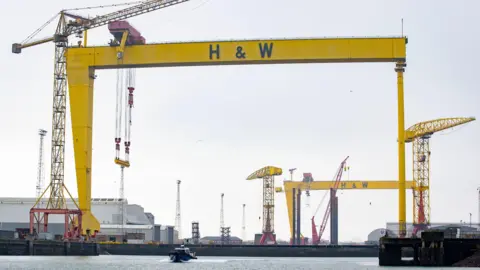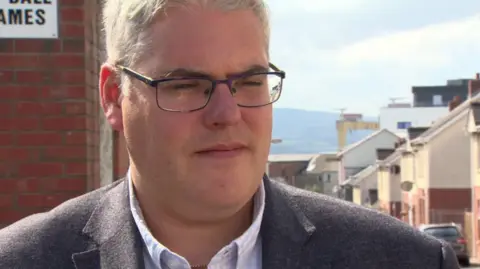ARTICLE AD BOX
1 hour ago
By John Campbell, BBC News NI economics and business editor

 PA
PA
Harland and Wolff employs about 1,500 people
The government is due to explain why it has refused to give financial support to Harland and Wolff.
The loss-making shipbuilder had applied for a loan guarantee of up to £200m.
On Friday it said its bid had been unsuccessful and that its chief executive had left his job.
The company is in talks with its lender, Riverstone, and is hopeful of agreeing additional funding within days.
However that still leaves questions about its long-term future.
The company’s shares are currently suspended after it failed to file audited accounts on time.
It has appointed Rothchilds bank to review strategic options which could include a sale of the business.
The Business Secretary, Jonathan Ashworth, is due to update parliament later on Monday.
'Difficult speculation'
On Friday, Gavin Robinson, MP for East Belfast, said the news provided "clarity" following "difficult speculation over the last number of weeks about the future of the yard and the government's intention for the yard".
He added: "On Monday we need to hear very clearly from government about the steps they will take to make sure administration is not on the cards, that those employed by the yard have a future and the government contracts there are an attractive proposition.
"The work that needs to continue is to not only reassure those who have been frustrated by negative briefings over the last number of weeks, but to see, very clearly, the pathway forward."


Gavin Robinson said there needs to be a pathway forward
Harland and Wolff employs about 1,500 people, mainly at its Belfast shipyard as well as at two smaller facilities in Scotland and one in England.
In 2023 it was part of a consortium which won a major contract to build three Royal Navy support ships.
The company has had to invest significantly to prepare for that work which has contributed to its large losses.
It has also taken on loans from Riverstone which charge a high rate of interest.
It had hoped to use a government guarantee to refinance those loans at a lower interest rate and take on more borrowing.
That would have involved borrowing up to £200m from a consortium of UK banks with government acting as guarantor - meaning if the loans were to go bad the state would have to step in to repay the lenders.

 9 months ago
34
9 months ago
34








 English (US) ·
English (US) ·